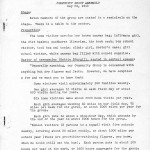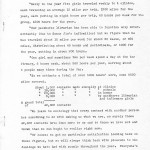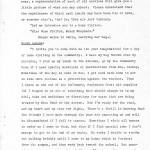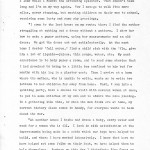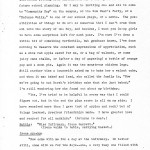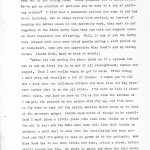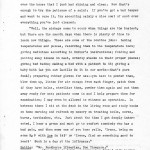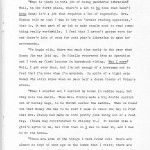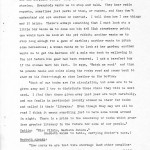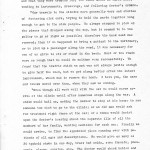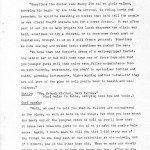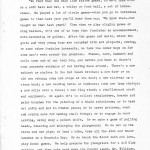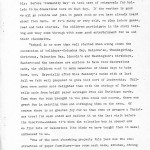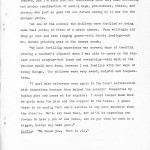Pine Mountain Settlement School
Series 13: EDUCATION
Series 19: STUDENTS
Community Group Assembly, May 20, 1942
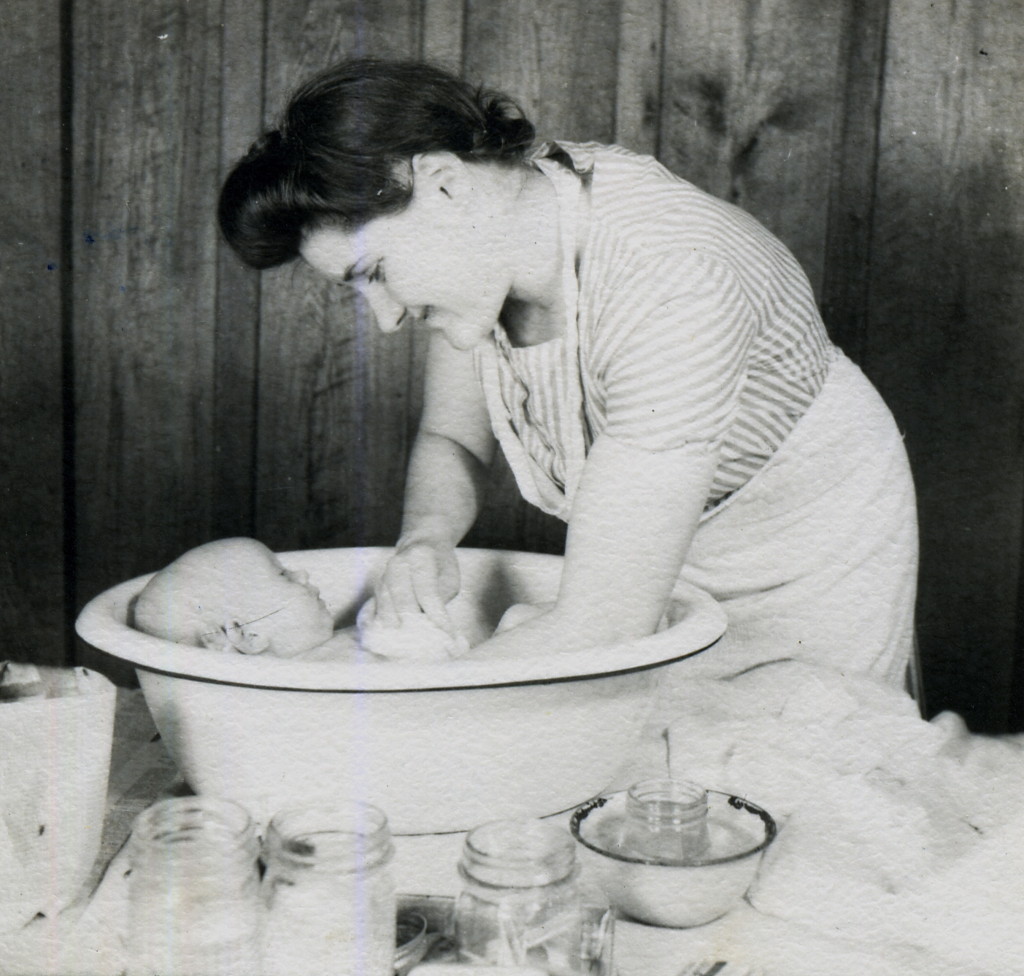
Woman bathing a baby. [dieter_012.jpg]
EDUCATION Community Group Assembly May 20 1942
TAGS: Pine Mountain community, community life, community group assembly 1942, nursing, babies, Ray Garner, Virginia Garner, photography, packhorse librarians, Infirmary, libraries, medical clinics, motion pictures, co-ops, cooperatives, education, industrial education, vocational education, Hattie Sturgill, Grace Rood
“Community Group Assembly May 20, 1942” is a narrative written about the Community Group educational program at Pine Mountain to accompany a film made by Virginia and Ray Garner, who were contracted through the Harmon Foundation to film the unique educational program activities at the School. The narrative describes the work of the Community Group and the Co-op program at Pine Mountain and the variety of projects that took the students out into the community to work with families. The student activities included the Packhorse Librarian program, assisting in the Infirmary, community medical clinics and home visits, and the work in the Co-op Store and much more. The narratives are first-hand accounts offered by students who participated in the unique program.
The following script contains the narratives of seven students and is coordinated by a Master of Ceremonies, Hattie Sturgill, a student who worked with Grace Rood at the School Infirmary. She introduces each student and the student then describes the work they engaged as a member of the Community Group.
One student says:
We learn in sociology that every contact with another person has something to do with making us what we are, so surely those … contacts have done more to us and to those we have met and known than we can begin to realize right now.
The activities of the students are then described in a detailed script and accompanied by the visual narrative of the student activities filmed by the Garners. The film stills were given to Pine Mountain and many of them show up in various staff albums and documents of the school. The images and this script provide one of the most detailed accounts of the Co-op program at Pine Mountain.
The Garners later became important contributors to the development and history of documentary film in the United States and later in international circles. Their beginning skills at narrative film-making are well captured in this early effort.
TRANSCRIPTION: COMMUNITY GROUP ASSEMBLY May 20, 1942
Page 1. [community_grp_assemb_001.jpg]
Pine Mountain Settlement School
Pine Mountain, Kentucky
COMMUNITY GROUP ASSEMBLY
May 20, 1942
Stage:
Seven members of the group are seated in a semicircle on the stage. There is a table in the center.
Properties:
The home visitor, her brown canvas bag; infirmary girl, the diet basket; packhorse librarian, his book sack; boy school visitor, tool box and tools; clinic girl, doctor’s case; girl school visitor, white canvas bag filled with the school supplies.
Master of ceremonies (Hattie Sturgill. seated in center) speaks:
“Generally speaking, our Community Group Is concerned with anything but dry figures and facts. However, we have compiled a few and we want you to know that:
Home visitors approximately 100 families weekly.
One girl averages 15 visits on each field day or about 600 visits during the year.
Six home visitors make about 36OO home visits per year.
Each girl averages walking 12 miles on her field day, 72 miles per week for six girls, or about 3000 miles per year for the group.
Each girl puts about a nine-hour day, which amounts by the end or the year to about 2000 hours for the group.
“School visitors (3 persons to a squad) visit five schools weekly, covering about 25 miles weekly, or about 1000 miles per school year. (These are pre-rubber-rationing figures, you know, when we could still use the bus.) Each person puts in about 100 hours per year at the work, or 1400 hours aggregate for the group.
Page 2. [community_grp_assemb_002.jpg]
“Early in the year, five girls traveled weekly to 4 clinics, each traveling an average 12 miles per trip, 1200 miles for the year, each putting in eight hours per trip, 40 hours per week for the group, 1200 hours for the year.
“Our packhorse librarian has been able to function only intermittently (due to Sunny Jim’s infirmities) but we figure that he has traveled about 15 miles per week for about 25 weeks, or 625 miles, distributing about 40 books and periodicals, or 1000 for the year, putting in about 200 hours.
“One girl and sometimes two per week spend a day at the Infirmary, 6 hours each, about 360 hours per year, serving about 5 people man times during the day.
“So we estimate a total of over 5000 hours’ work, some 6000 miles covered.
| About 1800 | contacts made annually | at clinics |
| About 18,000 | contacts made annually | at schools |
| About 20,000 | contacts made annually | in homes |
| About 3,000 | contacts made annually | by Packhorse Librarian and by Infirmary girls |
| TOTAL 42,800 CONTACTS |
“We learn in sociology that every contact with another person has something to do with making us what we are, so surely those 42,800 contacts have done more to us and to those we have met and known than we can begin to realize right now.
“Of course we get no particular satisfaction looking back on those figures, but we will always think back with pleasure to the dealings we have had with people throughout the year. Everyone’s work has been full of human interest. By way of initiating the…
Page 3. [community_grp_assemb_003.jpg]
…’Co-ops,’ giving them a pre-view of what they may possibly do next year, a representative of each of six services will give you a little picture of what you may expect. Please understand that the experiences of which each speaks may have been his or hers, or someone else’s, that Is, they are just typical.
“Let me Introduce you to a home visitor.
Miss Home Visitor, Sarah Shepherd.”
(Sarah walks to table, carrying her bag.)
Sarah speaks:
“I invite you to come with me (In your imagination) for a day of home visiting in the community. I have my bag thrown over my shoulder, I pick up my lunch in the kitchen, go by the Community Room if I need special materials or instructions from Mrs. [Berdina] Bishop. Sometimes if the day is cold or wet, I get sent back home to put on some more clothes as a protection against the weather. Then I check in and out of the Infirmary, replenish first aid supplies (If I happen to be out of something that should always be in my kit), take out medicines or directions for cases that are being treated by Miss [Grace] Rood or the doctor. Now I’m ready for the road, and my heart and my step are light. There’s a thrill in knowing that the friends I made through the year are expecting me and will be disappointed if I fail to appear. Sometimes I visit all houses in order as I come to them, but then if I find special jobs I don’t manage to get to the end of my route. So today I decide to strike out walking briskly until I come to my house which is furthest from the campus and then work back toward the school. But meantime someone sees me passing, hails me, ‘Sarah, won’t you come in and get a splinter out of Bobby’s toe, and doctor It for him? I can’t manage him alone!’ I usually have some worthless ‘pretties’…
Page 4. [community_grp_assemb_004.jpg]
…in my bag, and with the promise of a ‘pretty,’ Bobby behaved like a lamb while I removed the offending splinter. That doesn’t take long and I’m on my way again. Now I manage to walk five more miles, never stopping, but meeting children on their way to school, receiving some Iusty and some shy greeting.
“I come to the last house on my route; there I find the mother struggling at cutting out a dress without a pattern. I show her how to make a paper pattern, using her measurements and an old dress. We got the dress out satisfactorily. At the next home, I doctor ‘fall sores,’ find a child sick with the ‘flu, give him lots of liquids — juices, thin soups, water, etc. My next experience is to help paper a room and to read some stories that I had promised to bring to a little boy confined to his bed for months with his leg in a plaster cast. Then I arrive at a home where the mother, who Is unable to write, wants me to write two letters to her children far away from home. Next, I run into a quilting party, have a chance to visit with several women at once, to put in some stitches of my own and to admire the nice piecing. In a gathering like this, or when the men folks are at home, my current history class comes in handy, for everyone wants to talk about the war.
“At another house, I bathe and dress a baby, carry water and wood for a woman who Is ill. I look in with satisfaction at the Improvements being made in a cabin which our boys have helped to build, and where I have worked intensively. I know that here we have helped set some on their feet, we have helped them to help themselves. Perhaps on this day, I distribute Pine Cones [PMSS newsletter] or Woman’s Day [magazine] at each house. Or this may be the day when I’m asking…
Page 5. [community_grp_assemb_005.jpg]
…questions, jotting down Information for a survey to be used in future school planning. Or, I may be inviting one and all to come to ‘Community Day’ on the campus, or the New Year’s Party, or a ‘Defense Rally,’ to one of our school plays, or a movie. The possibilities of things to do are so numerous that I can’t cram them all into the story of one day, and besides, I want you Co-op girls to have some surprises left for next year. I’m sure I’ve done a little bit of something worthwhile but, goodness knows, I’ve done nothing to deserve the constant expressions of appreciation, as a nice red apple saved for me, or a bag of walnuts or some juicy cane stalks, or (after a day of papering) a bottle of orange pop and a moon pie. Again it was two monstrous chicken legs. Still another time a housewife asked to bake her a walnut cake, and when It was baked and iced, she called the family in, ‘Now we’re going to eat Sarah’s birthday cake that she just baked.’ I’m still wondering how she found out about my birthday.
“Yes, I’ve tried to be helpful in every way that I could figure out, but in the end, the plus score is all on my side. I have received more than I gave (not of apples and such) but of things learned, precious friendships made. I have greater love and respect for all mankind.” (Returns to seat.)
Hattie: “Miss Infirmary, Irene Garrett.”
(Irene walks to table, carrying basket.)
Irene speaks:
“Now come with me for a day at the Infirmary. Or, better still, come with me for two days — one, a very busy one filled with a number of babies or a number of sore throats, the other, just an ordinary day with four or five patients, not very sick.
Page 6. [community_grp_assemb_006.jpg]
“We go by way of the kitchen door. Miss Rood pokes her head out of the living room, ‘Thank goodness you are here, Irene! We’ve got an overflow of patients and we must do a lot of shiftIng around.’ I find that a pneumonia patient has come In and has to be isolated, two or three babies have arrived, so instead of keeping one mother alone in the maternity ward, they must be put together in the front ward; then they can talk and compare notes on their beautiful new offspring. Well, If any of you two hefty boys (flexes arm) have ever tried gently moving sick persons up or downstairs, then you can appreciate Miss Rood’s and my strong backs. (Leans back, hand on back at waist.)
“After all the moving the place looks as a cyclone had hit It and my job is to get it straightened, dusted and mopped. Then, I can really to get to work. First thing, I must wrap end sterilize a lot of linens. I think you’ve all had a peek into the infirmary kitchen and have seen the big pressure cooker that is on the oil stove. I’ll have to fill it about three times, and just as sure as I’m as far from the kitchen as I can get, the potcock on the cooker will fly up, and I’ll have to fly down to shut off the shrill whistle which warns me to look at the pressure gauge. Inside each batch of things to be sterilized I must place a little glass tube like this (holds up a diack** for all to see) and the tube must turn red, like this (holds up another, a used one) to show that the sterilizing has been perfect and that I’m going to pass no germs on to the patients. And Miss Rood has to see that little red tube, called a ‘diack,’ before she’ll accept the job. So there is great joy when the tube shows red and a great wailing if it doesn’t, for then the job is to be done all over again.
**[diack: A hermetically sealed glass ampule that contains a colored pellet containing a chemical indicator that reliably melts at a specific sterilization temperature.]
Page 7. [community_grp_assemb_007.jpg]
“Then it’s apt to be a windy day, or something boils over on the stove, the flame shoots up and we have a soot storm all over the house that I just had shining and clean. Now that’s enough to try the patience of a saint. If you’ve got a bad temper and want to cure It, try accepting calmly a nice coat of soot over everything you’ve just cleaned.
“Well, the mishaps seem to occur when things are the busiest, but there are the smooth days when there Is plenty of time to learn new things. These are some of the routine jobs: taking temperatures and pulses, recording them in the temperature book; giving medicines according to doctor’s instructions; folding and putting away linens in neat, orderly stacks in their proper places; giving bed baths; making a bed with a patient in it; giving a baby bath (as you saw Lucille do it in our movie — that’s pure fun!); preparing rubber gloves for use — you have to powder them, blow them up, listen for air escape from each finger, patch them if they have holes, sterilize them, powder them again and put them away ready for use; patients come in and I help prepare them for examination; I may even be allowed to witness an operation. In between times I sit at the desk in the living room and study books on home nursing and refresh my memory on treating boils, sores, burns, toothaches, etc. Just about the time I get deeply interested, I hear a groan and rush to go to comfort somebody who has a bad pain, and then someone of you boys yells, ‘Irene, bring me some H2O with ice in it!’ Or, ‘Irene, find me something good to read!’ Such is a day at the Infirmary.”
Hattie: “Mr. Packhorse librarian, Don Thompson.” (Don walks to table, carrying bag filled with books.)
Page 8. [community_grp_assemb_008.jpg]
“What is there in this job of being packhorse librarian? Well, in the first place, there’s a lot to be done that hasn’t been done; it’s a job that requires a lot of ingenuity. Mrs. [Birdena] Bishop told me that I was to try to ‘create reading appetites,’ that is, it was part of my job to make people want to read something really worthwhile. I feel that I haven’t gotten very far and there is a lot of room for next year’s librarian to make improvements.
“To begin with, there was much time early In the year when Sunny Jim [the horse] was laid up. He finally recovered from an operation and I took my first lessons in horseback riding. Was I sore? Well, I got over that, but I’m not enough of a horseman yet to feel that I’m boss when I’m mounted. In spite of a tight rein, Sunny Jim still shies when we pass half a dozen trucks at Nolan’s store.
“When I started out I carried my books in saddle bags, but they were too small. Then Mrs. Bishop made a big double carrier out of burlap bags, to be thrown across the saddle. When we found out that Sunny Jim was to be sold, I came to class one day to find that Mrs. Bishop made me this pretty pink thing out of a feed bag. (Holds bag outstretched to display it.) It looked like a girl’s apron to me but from then on I was to wear it, and I was to be the horse.
“These are some of the things I have found out: There are almost no boys of teen age in the homes that I visit; there are very few men at home either; so most of my readers are women and small children; The women like Life Magazine, Woman’s Day, Reader’s Digest, and some novels; The small children want picture…
Page 9. [community_grp_assemb_009.jpg]
…books and fairy tales, and those a little older like Indian stories and airplane books. They ask for Zane Grey and adventure stories. Everybody wants me to stop and talk. They hear radio reports, sometimes just parts of them, or rumors, and they don’t understand and are excited or worried. I tell them how I see things and it helps. There’s always something that I must look at: a little boy wants me to come see his 4-H Club strawberry patch; one would have me look at his pet rabbit; another wants me to stop long enough for a game of marbles; another to pitch some horseshoes; a woman want me to look at her garden; another wants me to get the harness off a mule who took to wallowing In the lot before his gear had been removed. I ask a barefoot boy if the stones hurt his feet. he says, ‘Watch me run!’ and then he pounds heels and soles along the rocky road and comes back to show me his feet — tough as shoe leather on the bottom.
“Most of our books are for circulation, but some are to be given away and I try to distribute those where they will be most used. I find that those given away last year are kept carefully, and one family in particular proudly showed me their few books and called it their ‘library.’ Even though they may not all be read I think it means something just to have some books around in sight. There is a pride in the ownership of books which promises greater literacy in the future for some of our people.”
Hattie: “Miss Clinic, Marbeth Peters.”
(Marbeth walks to table, carrying doctor’s bag.)
Marbeth speaks:
“How sorry we are that tire shortage (and other complications) make visits to outlying clinics seem a remote possibility for next year! We usually traveled in pairs, two girls with the…
Page 10. [community_grp_assemb_010.jpg]
…doctor. One of us acted as secretary — taking patients’ names and what they were treated for; the other acted as nurse-aide, tending to instruments, dressings, and following doctor’s orders.
“Our travels to the clinics were generally very sad stories of doctoring sick cars, trying to hold the parts together long enough to get to the sick people. We always stopped to pick up the pieces that dropped along the way, but it seemed to be the policy to go as light as possible; therefore the back seat was removed; then if we happened to bring a patient to the Infirmary, or to pick up passengers along the road, it was necessary for one of us girls to sit or stand on the back. Most of the roads were so rough that we could do neither very successfully. We found that the traffic which we met was not always polite enough to give half the road, but we got along better after the latest improvement, which was to remove the hood. I tell you, the cars and trucks moved over then, when they saw us coming.
“Even though all went well with the car we would never arrive at the clinic until after numerous stops along the way. A child would hail us, asking the doctor to stop at his house to see someone too sick to go to the clinic; or an old man would ask for treatment right there at the car, or a woman would insist upon the doctor’s hearing about the separate ills of all the members of her family, wanting medicine for each one. Finally, we would arrive, to find the appointed place running over with patients of all ages and descriptions. We would give as many as 30 typhoid shots in one day, treat bad colds, sore throats, pneumonia, ulcers, sprains, etc. The doctor would check babies and prescribe formulas for feeding the sick ones. He had a thriving business in one phase of dentistry — there were always several people there for tooth extractions because our doctor pulled for…
Page 11. [community_grp_assemb_011.jpg]
…fifty cents a tooth — much cheaper than a trip to town to the dentist.
“Sometimes the doctor rode Sunny Jim and we girls walked, carrying his bags. By the time he arrived, in riding boots and breeches, he would be smelling so horsey that he ‘d tell the people he was afraid they’d mistake him for a horse doctor. It was often part of our job to help prepare the lunch wherever the clinic was held, sometimes to fry a chicken, or to cook some fresh meat or vegetables, brought to us as a gift from a patient. Sometimes we rode one way and walked back; sometimes we pushed the car.
“We hope that the doctor’s dream of a well-equipped travelIng clinic car or bus will come true one of these days and that you younger girls will then enjoy even fuller acquaintance than we, with records, treatments, the stuff in mysterious bottles and boxes, gleaming instruments, high-sounding medical terms — for they are all part of the plan to help people back to health and usefulness.”
Hattie: “Mr. School Visitor, Carl Farley.”
(Carl walks to table, carrying tool box and tools.)
Carl speaks:
“Well, no need to tell you that we fellows are outnumbered in the class, as well as here on the stage, but when you hear about the heavy end of the program which we hold up you’ll know that it takes more than two girls to one of us to make the scales balance. Again, I don’t mean to tell you that I did every one of the things in the long list of our activities at the schools, but if I didn’t, one of the other boys did. When we made our weekly visits it was one of us fellows who drove the bus. After we arrived we did the gentlemanly thing — we usually let the ladies do…
Page 12. [community_grp_assemb_012.jpg]
…the talking in the school room, but on the playground they turned the leadership over to us.
“We find that the kids like active games, so we’d take with us a soft ball and bat, a volley or foot ball, a set of horseshoes. We played a lot or circle games — when you go to introduce games to them next year you’ll hear them say, ‘We know that — Cob [Tye Cob?] taught us that last year!’ Then when we play singing games or sing ballads, it’s one of us boys that furnishes an accompaniment, with harmonica or guitar. After the games and music, while the girls and very young boys are occupied with art projects, sewing, or other feminine interests, we take the older boys on for some man’s work around the premises. Planes, saws, hammers, and nails come out of our tool box, and before you know It there’s some concrete evidence of our having been around. There’s a new cabinet or shelves in the hot lunch kitchen; a new door or an old one rehung; some new steps at the door; a new stairway up a steep bank; a reading table or bookcase; some new lamp shelves; a new stile over a fence; a new flag stand; a shuffleboard court and equipment. Or, again, it’s to collect stepladders, boards and paint brushes for the painting of a whole schoolroom; or to take out putty and put in window panes; or to carry patterns, wood and coping saws for making things; or to engage in wood carving, using only a pocket knife. Or we make a game of pulling weeds, cleaning and enlarging the playground. Or, we put up the stove and new pipe; or lead a hike, take all the kids and their lunches on a Mountain Day. Or we teach the Scout oath and laws, [and] play Scout games. We help prepare the youngsters for a 4-H Club meeting, and then take part when the County agent, Mr. Williams, arrives for a program about poultry, gardens, the necessary foods, etc. When we can find nothing else to do we help the girls with…
Page 13. [community_grp_assemb_013.jpg]
…whatever projects they have on hand; we go out to gather pine cones and acorn cups to be painted for Christmas tree ornaments; we bring in the Christmas tree itself; we gather bright branches for Hallowe’en decorations, help make the black cats, witches, bats and pumpkins, or other holiday motifs. We assist at play rehearsals, carry costumes to and from our property room. We act as auctioneers at box and pie suppers at the school and what’s more we buy the pies and boxes — the proceeds from which go into school improvements. We deliver packs of newspapers and magazines at homes which we pass. We pick up patients to be brought to the Infirmary.
“What is this job of school visiting? Well, it is standing in readiness to do everything that you can see to do, and on top of that, what they can think up for you, too.”
Hattie: “Miss School Visitor, Flora Mae Ford.”
(Flora walks to table carrying canvas bag filled with school supplies.)
Flora speaks:
“Carl has told you of so many things that the boys do that there doesn’t seem to be much left to account for the time that the girls put in. Yes, he told you rightly when he said that they leave the talking to the girls, but I’m not so sure that is just because the girls can talk. We go in with our supplies, such I have here In my bag (shows paper, scissors, crayons, books, ballad books, etc.) The teacher brings to a close whatever she has been doing before our entrance and says, ‘They are yours for the afternoon!’
“We usually began all programs this year by singing America, The Star Spangled Banner, or America, The Beautiful and then pledging aIlegiance to the flag. We have furnished the flags in…
Page 14. [community_grp_assemb_014.jpg]
…several cases. Then we have lusty singing sessions of familiar songs, rounds, carols, and ballads, such as we sing here in Assembly. Before ‘Community Day’ we took care of rehearsal for ballads to be dramatized here on that day. If the weather is good we go outside and join in games such as you have already heard about from Carl. If it’s rainy or very cold, we play indoor games, read and tell stories. The children participate in the story telling and they come through with some good entertainment for us and their classmates.
“School is no more than well started when along comes the succession of holidays — Columbus Day, Hallowe’en, Thanksgiving, Christmas, Valentine Day, and Lincoln’s and Washington’s birthdays, Easter — and the teachers are anxious to have room decorations made, the children want to make mementos of those days to take home, too. Especially after Miss Peabody’s weeks with us last fall, we felt well prepared to give that sort of leadership. Children were never more delighted than with the strings of Christmas bells made from bright paper salvaged from old Christmas cards. Then when the boys brought in the pine cones and acorns, there was great fun in painting them and hanging them on the tree. Of course there is no greater joy for us than when we prepare a Christmas treat for each child and deliver it on the last visit before the vacation — unless it’s when the valentine box is opened and we find lots of valentines (the kinds we have taught them to make) addressed to us.
“One of the most absorbing projects this year was the constructIon of paper furniture — one room each week, kitchen, dining room, bedroom, living room — until each child had a whole house furnished. For a child who had never seen a sink, a gas stove, or a davenport, this was an introduction to a bigger world.
Page 15. [community_grp_assemb_015.jpg]
“Some of us were privileged to act as assistant 4-H Club leaders, and I am sure that our insistence upon very neat stitching and proper construction of sewing bags, potholders, towels, and aprons, is just as good for our future sewing as it was for the younger girls.
“At one of the schools the children were thrilled doing at doing some real acting in front of a movie camera. Very willingly did they go over and over singing games — with Hattie leading — and Mr. [Ray] Garner grinding away at the camera crank.
“My most thrilling experience was several days of teaching (during a teacher’s illness) when I was able to carry on the regular school program — hot lunch and everything — very much as the teacher would have done, because I was familiar with her ways of doing things. The children were very sweet, helpful and cooperative.
“I must make reference once again to the boys’ satisfaction with themselves because they helped the schools’ treasuries by buying pies and boxes at the suppers. I would remind them that we girls made the pies and the suppers in the boxes. I guess there is no saying that one’s service is any more valuable than the other’s. We ‘ve all been busy, but we’ll be expecting you Co-ops to have a lot of new ideas, and to put them to work in a bigger, better way next year.”
Hattie: “We thank you. That is all.”
GALLERY: COMMUNITY GROUP ASSEMBLY May 20, 1942
- Community Group Assembly. May 20, 1942. pg. 01
- Community Group Assembly. May 20, 1942. pg. 02
- Community Group Assembly. May 20, 1942. pg. 03
- Community Group Assembly. May 20, 1942. pg. 04
- Community Group Assembly. May 20, 1942. pg. 05
- Community Group Assembly. May 20, 1942. pg. 06
- Community Group Assembly. May 20, 1942. pg. 07
- Community Group Assembly. May 20, 1942. pg. 08
- Community Group Assembly. May 20, 1942. pg. 09
- Community Group Assembly. May 20, 1942. pg. 10
- Community Group Assembly. May 20, 1942. pg.11
- Community Group Assembly. May 20, 1942. pg. 12
- Community Group Assembly. May 20, 1942. pg. 13
- Community Group Assembly. May 20, 1942. pg. 14
- Community Group Assembly. May 20, 1942. pg. 15
See Also:

